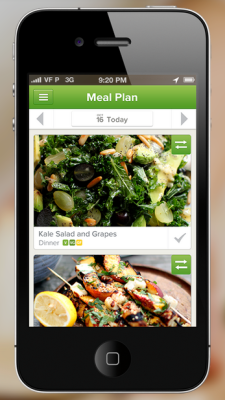Toronto-based Venio is hoping to capitalize on healthy eating trends with a mobile app that allows users to set dietary restrictions, and then provides them with a customized set of meals depending on which ones during the day they want suggestions for. Venio culls its meals from noted food bloggers and quality content sources, in an effort to make sure that its content doesn’t bore or frustrate users.
The challenge for Venio, and for anyone attempting to provide a product that acts as a prescriptive tool when it comes to personal health, is not only to get users, but to get them coming back. Fad diets remain such because people aren’t great at sticking to schedules, routines and systems for losing weight or getting healthy. Others who have tried to gain traction in this space so far haven’t hit on breakout success, though Fooducate has decent traction in the Android market, and Meal Snap made a big splash when it came out initially, though we haven’t heard much about its traction since its launch in April of 2011. The point is, there’s no breakout star in this category, even though health and fitness apps and devices in general seem to be hot area for startups and apps over the last few years.
Venio, which launched on the App Store a little over two weeks ago, has already managed to sign on over 5,000 users, and the company says that its members have already recorded around 3,000 meals eaten as suggested by and recorded to their app. Thirty percent of Venio’s users are daily active users, which is “very high for the category,” according to Venio co-founder Jon Car-Harris.
“Health needs to be actionable and relevant to people in a busy time. Most things like calorie counting or a fad diet isn’t sustainable,” Venio’s Karim El Rabiey told me. “We’re going to make health helpful and relevant to you, to make it easier to maintain over a long period of time.”
To do that, Venio partners with top industry bloggers for quality content and a growing database of recipes that means people won’t see many repeats if variety is what they’re after. But it also plans on introducing a number of filters to make it easy for users to find exactly the kind of meal plan that bests suits their life. Planned updates will bring plenty of dietary preference options to help with that, adding to the current vegan and vegetarian filter choices.
“We’re bringing in more dietary restrictions for people, so it’s really possible for anyone to have their meals catered to them,” Car-Harris explained. “We’re going to have gluten-free in there, we’re adding all the types of vegetarianism, and basically every type of major allergy in there, too.”
Longer term, that will mean opening up partnerships with Atkins, The Sonoma Diet, and other meal plans that have different rules and means for losing weight and staying healthy. These could bring in additional revenue, depending on how they’re structured, and the team says they’re currently looking at introducing those elements sometime next year, owing to the sales cycle timeline of forging these partnerships.
Venio offers people analytics on their progress, tailors meal plans to gender, age, height and weight and is even working with restaurants and grocers to establish a Venio standard by which shoppers can check how the food or meals they’re purchasing meet the nutritional requirements of their planned meals. Platform expansion is also in the startup’s product plans, though for now, a mobile app seems to be the best and most useful way to get users active when and where they eat their meals.
The startup has ambitious plans, but its biggest challenge will still be making sure it can not only sign on new users, but also keep them around and engaged. There’s remarkably little evidence out there to suggest that consumers are willing to adopt a meal planning app with any kind of scale, but Venio is banking on the fact that that’s just because no one’s given them the right tool yet.
